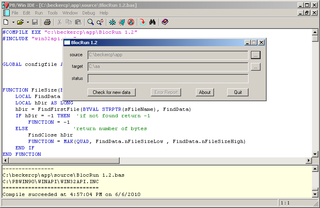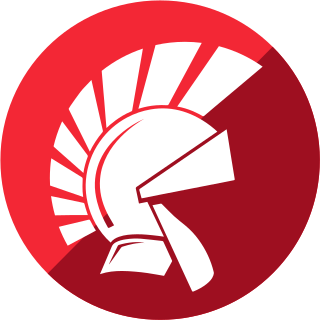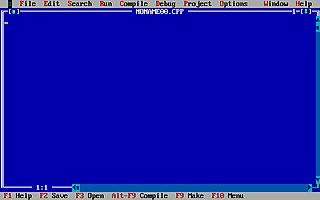Borland Software Corporation was a computer technology company founded in 1983 by Niels Jensen, Ole Henriksen, Mogens Glad, and Philippe Kahn. Its main business was the development and sale of software development and software deployment products. Borland was first headquartered in Scotts Valley, California, then in Cupertino, California, and then in Austin, Texas. In 2009, the company became a full subsidiary of the British firm Micro Focus International plc.
An integrated development environment (IDE) is a software application that provides comprehensive facilities for software development. An IDE normally consists of at least a source-code editor, build automation tools, and a debugger. Some IDEs, such as NetBeans, JDoodle and Eclipse, contain the necessary compiler, interpreter, or both; others, such as SharpDevelop and Lazarus, do not.
Pascal is an imperative and procedural programming language, designed by Niklaus Wirth as a small, efficient language intended to encourage good programming practices using structured programming and data structuring. It is named after French mathematician, philosopher and physicist Blaise Pascal.
Turbo Pascal is a software development system that includes a compiler and an integrated development environment (IDE) for the Pascal programming language running on CP/M, CP/M-86, and DOS. It was originally developed by Anders Hejlsberg at Borland, and was notable for its extremely fast compilation. Turbo Pascal, and the later but similar Turbo C, made Borland a leader in PC-based development.

PowerBASIC, formerly Turbo Basic, is the brand of several commercial compilers by PowerBASIC Inc. that compile a dialect of the BASIC programming language. There are both MS-DOS and Windows versions, and two kinds of the latter: Console and Windows. The MS-DOS version has a syntax similar to that of QBasic and QuickBASIC. The Windows versions use a BASIC syntax expanded to include many Windows functions, and the statements can be combined with calls to the Windows API.
C++Builder is a rapid application development (RAD) environment for developing software in the C++ programming language. Originally developed by Borland, as of 2009 it is owned by Embarcadero Technologies, a subsidiary of Idera. C++Builder can compile apps for Windows, iOS, macOS, and Android. It includes tools that allow drag-and-drop visual development, making programming easier by incorporating a WYSIWYG graphical user interface builder.

Delphi is a general-purpose programming language and a software product that uses the Delphi dialect of the Object Pascal programming language and provides an integrated development environment (IDE) for rapid application development of desktop, mobile, web, and console software, currently developed and maintained by Embarcadero Technologies.
Object Pascal is an extension to the programming language Pascal that provides object-oriented programming (OOP) features such as classes and methods.

Free Pascal Compiler (FPC) is a compiler for the closely related programming-language dialects Pascal and Object Pascal. It is free software released under the GNU General Public License, with exception clauses that allow static linking against its runtime libraries and packages for any purpose in combination with any other software license.
Borland Kylix is a compiler and integrated development environment (IDE) formerly sold by Borland, but later discontinued. It is a Linux software development environment based on Borland Delphi and Borland C++ Builder, which runs under Microsoft Windows. Continuing Delphi's classical Greek theme, Kylix is the name for an ancient Greek drinking cup. The closest supported equivalent to Kylix is the free Lazarus IDE package, designed to be code-compatible with Delphi. As of 2010 the project has been resurrected in the form of Delphi cross compiler for Mac and Linux, as shown in the Embarcadero's Delphi and C++ Builder roadmap. As of September 2011 with Kylix discontinued the framework for cross-platform development by Embarcadero is FireMonkey.
Virtual Pascal is a free 32-bit Pascal compiler, IDE, and debugger for OS/2 and Microsoft Windows, with some limited Linux support. Virtual Pascal was developed by Vitaly Miryanov and later maintained by Allan Mertner.

Lazarus is a free, cross-platform, integrated development environment (IDE) for rapid application development (RAD) using the Free Pascal compiler. Its goal is to provide an easy-to-use development environment for programmers developing with the Object Pascal language, which is as close as possible to Delphi.

Turbo Vision is a character-mode text user interface framework included with Borland Pascal, Turbo Pascal, and Borland C++ circa 1990. It was used by Borland itself to write the integrated development environments (IDE) for these programming languages. By default, Turbo Vision applications replicate the look and feel of these IDEs, including edit controls, list boxes, check boxes, radio buttons and menus, all of which have built-in mouse support. Later it was deprecated in favor of Object Windows Library, the Win16 API, and the GUI tools of Borland Delphi.

Turbo C++ is a discontinued C++ compiler and integrated development environment originally from Borland. It was designed as a home and hobbyist counterpart for Borland C++. As the developer focused more on professional programming tools, later Turbo C++ products were made as scaled down versions of its professional compilers.
Borland C++ was a C and C++ IDE released by Borland for MS-DOS and Microsoft Windows. It was the successor to Turbo C++ and included a better debugger, the Turbo Debugger, which was written in protected mode DOS.
Turbo Delphi is a discontinued integrated development environment (IDE), created by CodeGear, which was targeted towards student, amateur, individual professionals, and hobbyist programmers. It used the Delphi programming language, which is a dialect of Object Pascal.
CodeGear is a wholly owned division of Embarcadero Technologies. CodeGear develops software development tools such as the Delphi Integrated development environment, the programming language Delphi, and the database server InterBase. Originally a division of Borland Software Corporation, it was launched on 14 November 2006.
Turbo Debugger (TD) is a machine-level debugger for DOS executables, intended mainly for debugging Borland Turbo Pascal, and later Turbo C programs, sold by Borland. It is a full-screen debugger displaying both Turbo Pascal or Turbo C source and corresponding assembly-language instructions, with powerful capabilities for setting breakpoints, watching the execution of instructions, monitoring machine registers, etc. Turbo Debugger can be used for programs not generated by Borland compilers, but without showing source statements; it is by no means the only debugger available for non-Borland executables, and not a significant general-purpose debugger.

Turbo51 is a compiler for the programming language Pascal, for the Intel MCS-51 (8051) family of microcontrollers. It features Borland Turbo Pascal 7 syntax, support for inline assembly code, source-level debugging, and optimizations, among others. The compiler is written in Object Pascal and produced with Delphi.
This page details the history of the programming language and software product Delphi.





